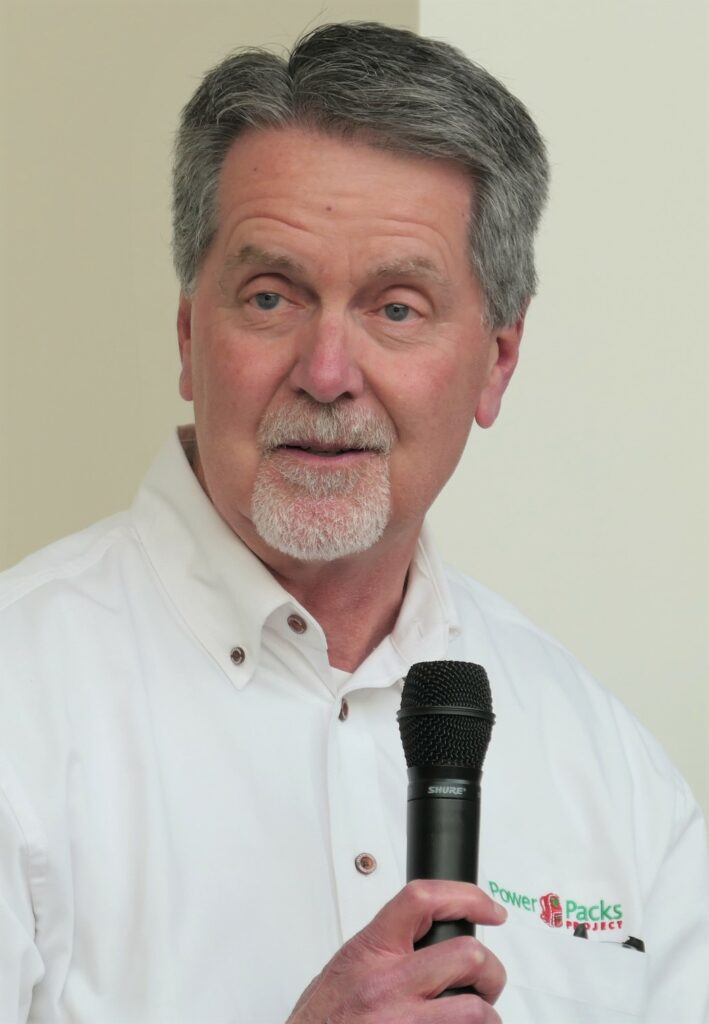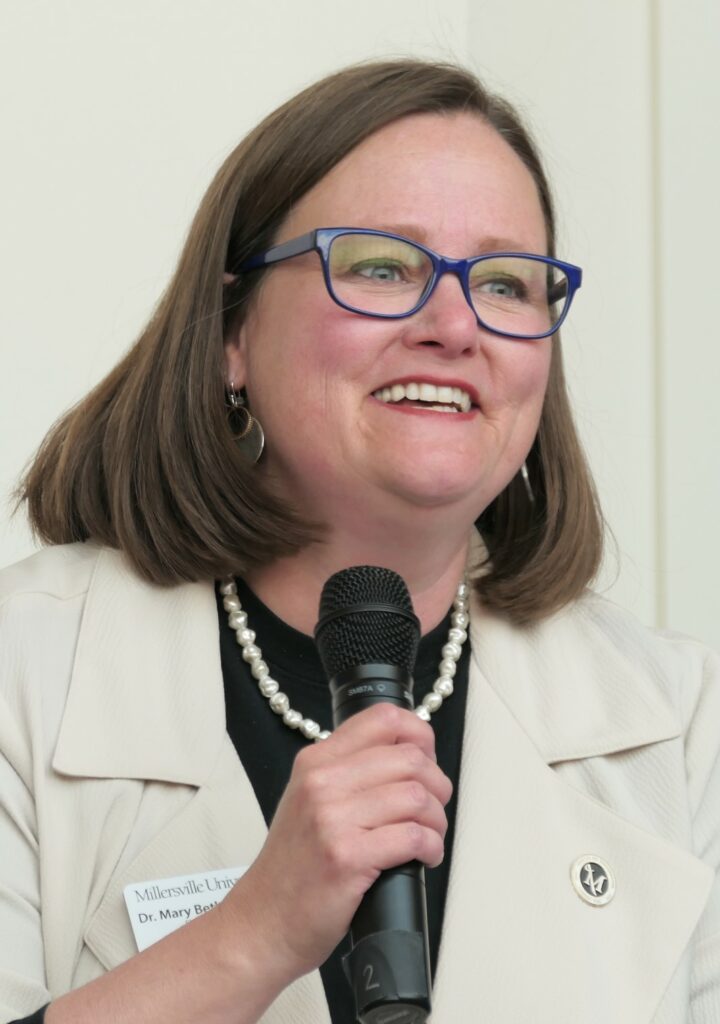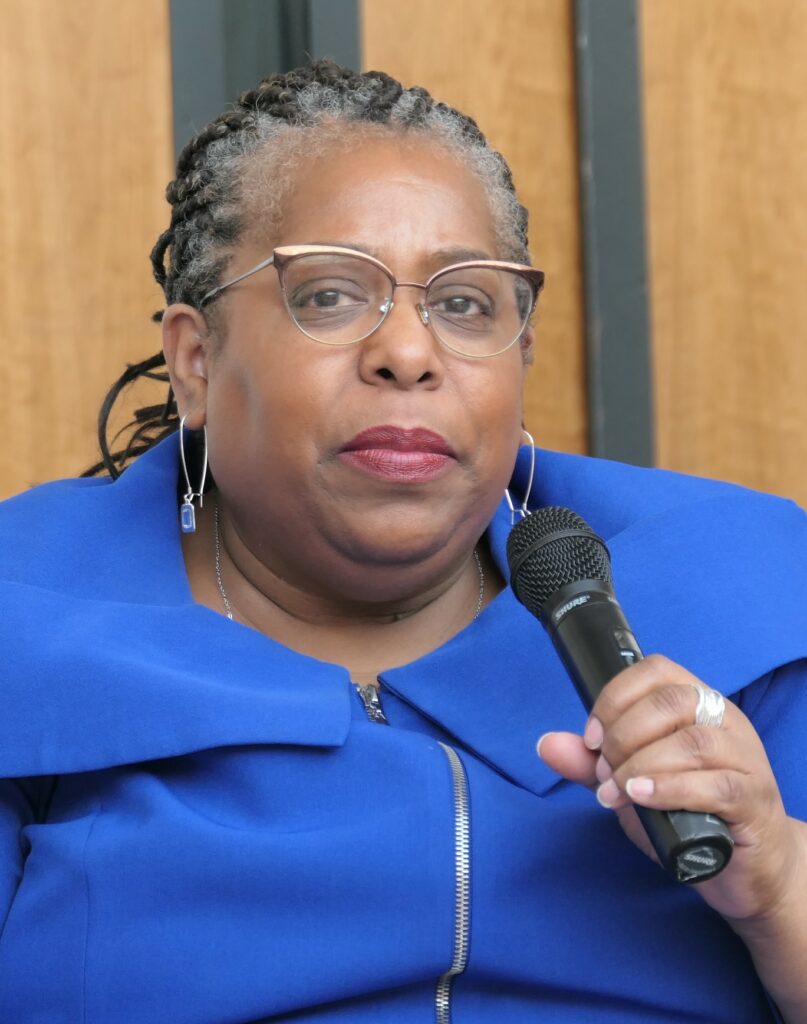(This article is part of One United Lancaster’s reporting on the Zero Hunger summit.)
When the pandemic shut down schools in 2020, Penn Manor School District staff sought to deliver meals to students over the district’s 120-sqaure-mile footprint.
“We really had to be resourceful to meet them at their geographic location,” district social worker Keila Torres said. “We were providing lunches for all of the families for the week – it was something that was very difficult.”
As part of Millersville University’s Zero Hunger summit, Torres joined colleague Lisette Rivera and Joy Meley, School District of Lancaster coordinator for the nonprofit Families in Transition, for a discussion on “Addressing Hunger in PreK-12 Settings” moderated by Jennifer Frank, a Millersville University social work professor.
As a social worker, Rivera said, she experiences a lot of emergency issues.
“It’s always on-the-ground work,” she said. “Our to-do lists change … We are actively working to identify our families and students who are in need.”
According to Rivera, an estimated 747 SDL students are ‘in transition’ in terms of housing, with almost 400 of them doubled up in housing, around 80 in hotels and motels, 75 in shelters and 200 more in unidentified situations, which she said can mean couch surfing or very temporary housing.
Assistance comes from an array of community partners. For Penn Manor, they include the Loft Community Partnership, which provides social services in the Penn Manor area; and Power Packs, which provides food boxes to families with school-age children to tide them over the weekends when school breakfasts and lunches aren’t available.

Power Packs currently serves about 1,500 families a week at 91 school districts in three counties, including Penn Manor and SDL.
The nonprofit will end up providing more than 460,000 meals over the 2022-23 school year, up from 380,000 in 2021-22, Executive Director Brad Peterson said.
Most of the families Power Packs serves are working families, Peterson said.
“It’s helping them stretch their food budget,” he said, giving them greater ability to make ends meet and providing hope.
Meley praised cafeteria workers for going the extra mile, getting to know students and pitching in to solve problems.
“They are amazing,” she said.
Near the end of the discussion, talk turned to how to deal with barriers to access.
Rivera explained that many families are hesitant to apply for anything: Some, she said, fear agencies getting involved, because of what intrusive interactions might result. Some are just not hopeful about the results of applications.
Torres said social workers and others have to explore whether students are getting needed food support. Rivera agreed, saying there’s a need to “play investigator” to identify those who are falling through the cracks.
Colleges and universities
The level of food insecurity among college students is higher than most people realize, panelists at the “Zero Hunger” summit said.
With a tertiary degree increasingly needed to secure a living-wage job, more students than ever are “non-traditional,” adults trying to squeeze in classes amid jobs and childcare responsibilities. When social work professors Jennifer Frank and Karen Rice surveyed 600 Millersville students, 36.5% reported some level of food insecurity.

“There’s a lot of need,” Wilson College Chaplain Derek Wadlington said.
Wadlington supervises Sarah’s Cupboard, a food bank at the college launched by Mary Beth Williams, who is now Vice President for Student Affairs at Millersville University. Wadlington and Williams were joined on the panel by Marion Wilson, chief diversity, equity and inclusion officer at Thaddeus Stevens College of Technology.
Students tend to hide their need, the three said, suggesting a number of strategies to overcome reticence: Sharing one’s own story, providing a shelf where students can grab snacks anonymously, asking a student to join them at lunch as a favor.

Millersville University, Wilson College and Stevens College are all part of Pennsylvania’s Hunger Free Campus network. Network members certify that they are taking steps to address student hunger: Convening a task force, maintaining a food bank, assisting eligible students to apply to the Supplemental Nutrition Assistance Program.
Williams and Wilson both described the ad hoc process of launching food banks at their schools: They saw a need and filling it, initially using their own money or discretionary funds from a department budget.

At Wilson College, administrators were skeptical at first, Williams said, but the level of subsequent usage convinced them. Today, Sarah’s Cupboard receives dedicated funding.
Millersville’s food bank is housed at The Hub, an on-campus nonprofit that provides a broad range of services, amenities and opportunities to socialize. Part of creating ease of access is making students feel at home, director Jacob Marino said. For example, a free meal on Monday is coupled with a game night.
“Students come in they’re eating meal, they’re playing games,” he said. “You don’t feel like you’re a part of something that’s charitable. You feel like you’re building community.”
Wilson College’s dining services provider collaborates with Sarah’s Cupboard, providing surplus food and helping to make food boxes for breaks. Donations are a great way to reduce food waste; the challenge is staying in compliance with food safety protocols, said John Johnson the executive chef for Millersville’s dining services, who served as moderator.

Besides food, students often need personal-care items like toothpaste and feminine hygiene products. Those on tight budgets face the threat of having their education derailed by an unexpected expense, such as a car repair or a late fee on a rent check.
Stevens College has an emergency fund to assist with those contingencies, Wilson said.
Small amounts of assistance can mean the difference between a student graduating or dropping out, and that’s a moral issue, Wadlington said: “We’ve got to get them through.”
An audience member asked: Shouldn’t colleges and universities be able to do more, given their huge budgets and astronomical tuition?
Administrations are pitching in to help, the panelists said, and money is tighter at universities than you might think. Still, “You’re asking the right question,” Williams said.






